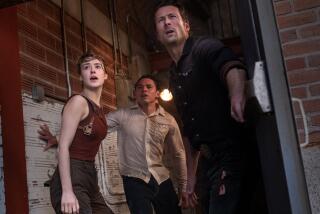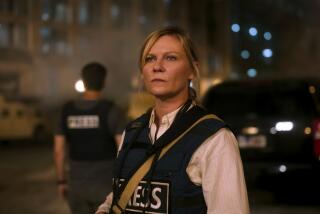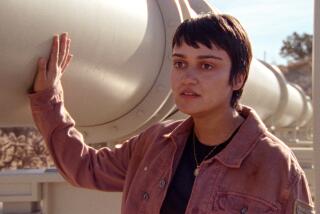Plugging In to a Power Outage for Promo Juice
- Share via
When the power failed across nine Western states last Saturday, a lightbulb went on at Gramercy Pictures.
The massive outage provided the perfect marketing hook for “The Trigger Effect,” a film starring Elisabeth Shue and Kyle MacLachlan that might have been lost in the box-office nether world of Labor Day weekend.
The original tag-line ad for the movie--”When nothing works, anything goes”--was quickly replaced with ads featuring a darkened city that resembled those for the summer’s biggest blockbuster, “Independence Day.” They read: “On August 10th, a massive power failure affected 9 Western states. On August 30th, it affects everyone. The Trigger Effect.”
“The Trigger Effect” is about what happens to a married couple (Shue and MacLachlan) and their good friend (Dermot Mulroney) when electricity goes out in a massive outage, not unlike the one just experienced by 4 million people from Canada to Mexico.
Indeed, what studio would not capitalize on the phenomenon? Especially since the real-life outage involved no serious injuries?
“It’s amazing the lengths these smaller distributors will go to. . . . I think it’s great they’re not afraid to black out nine states,” quipped David Koepp, the film’s writer and director.
Perhaps power outages are a trendy movie theme. Another oddly timed cinematic electricity failure occurs in “John Carpenter’s Escape From L.A.,” in which the threat of a global power shutdown is a key plot point. That movie opened the weekend of the power outage.
An earlier movie featuring a power outage as its central theme was “Where Were You When the Lights Went Out?,” which was about the power failure in New York City in 1965.
Although it seems prescient, “The Trigger Effect” was actually inspired by a British documentary series called “Connections,” said Koepp, who wrote the screenplays for “Jurassic Park” and “Mission: Impossible.”
The episode, Koepp said, focused on the blackout of 1965, then took the premise to the extreme, positing the question, “What if the power never came back?”
“In a lot of ways we live in a technology trap,” Koepp said. “Our society has created a technological world that the vast majority of its inhabitants don’t understand in the slightest. Every day we rely on hundreds of devices that we don’t understand.”
What ultimately prompted Koepp to base a movie on a mysterious power outage?
“I think it’s a subject that’s very rankling because nobody wants to feel vulnerable,” Koepp said. “And the fact is, we are. There’s no guarantee that things will keep working forever.”
The film explores what happens when the technology that we have taken for granted fails us.
“Repressed feelings and desires are all triggered by the blackout,” Koepp said. “When that safety net of technology is removed, the veneer of civilization can be kind of thin. It’s a kind of an exploration of those more primitive feelings that come out when the safety net of technology is gone.”
In “The Trigger Effect,” the power failure affects seven states and drags on for three days amid an atmosphere of spiraling anxiety and paranoia, Koepp said.
“Some people who originally saw my script said, ‘It’s a little farfetched,’ ” Koepp said. “It’s great to be able to say, ‘Oh, really?’ ”
More to Read
Only good movies
Get the Indie Focus newsletter, Mark Olsen's weekly guide to the world of cinema.
You may occasionally receive promotional content from the Los Angeles Times.










